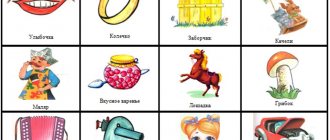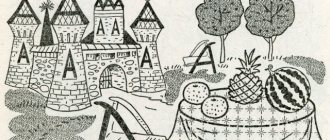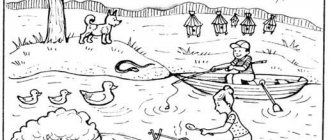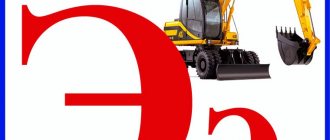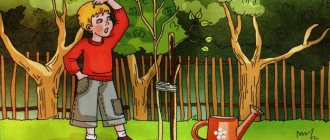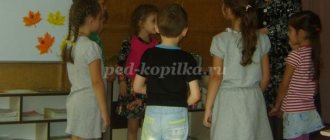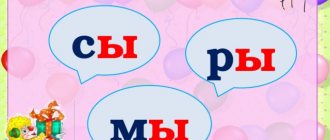Summary of a lesson on teaching literacy in a preparatory group. Sound and letter K
Summary of OOD on preparation for teaching literacy “The Magic World of Sounds and Letters.
Sound and letter K" Description of the material: This material will be useful to speech therapists, teachers of speech therapy groups, and teachers of general preparatory groups. Children's age is 6-7 years. Goal: to introduce the sounds K, Kь, the letter K, to improve the sound analysis of words. Correctional and educational tasks: to consolidate the concepts of “vowel sound”, “consonant sound”; introduce the sounds K, K, continue to teach how to select words with a given sound based on the proposed subject pictures, from memory; determine the place of the sound K in a word (at the beginning, at the end, in the middle); continue to learn how to determine the number of syllables in a word; improve sound analysis skills. Correctional and developmental tasks: to develop phonemic hearing, logical thinking, fine motor skills, visual and auditory attention, Correctional and educational tasks: to cultivate positive motivation for the learning process, the desire to help peers. Materials: magnetic board, object pictures, manual for the game “Settle the pictures into houses”, chips for drawing up a word diagram, chips for the game “Give me a word”, cards with letters, demonstration card with the letter K.
Progress of activity
Organizational moment Speech therapist: Children, Do you want to visit again a wonderful, magical country where sounds and letters live? What interesting things await us in the land of sounds and letters? I think interesting tasks and games await us there. Tell me, why do we learn letters and sounds? Children: To be able to read, write, speak beautifully. Speech therapist: It’s high time for everyone to hit the road. To make it easier for us on the way - Let's shout loudly “Hurray”! Repetition of the material covered
Game “Name the vowel sound”
Speech therapist: I will name the words, and you name the vowel sound that is in the middle of the word (closet, cat, mouse, oak, world, juice, varnish, side, tank, whale, dust, shower, gnome, leaf, tail, poppy, grandson). (Children call the vowel sounds a, o, s, u, i, o, a, ...) Message of the topic of the lesson Speech therapist: Listen to my funny poem and tell me what sound we will play with today, what sound is repeated most often? The cat was rolling a ball around, a round red ball. Like a prankster, like a wolf cub, our kitten tumbled. Children: The sound K is repeated. Speech therapist: That's right, we will play with the sound K. Let's pronounce the sound K together and feel how we pronounce the sound K. Children: The tongue arches its back, “jumps”, touches the palate, the tip of the tongue goes down, for air obstruction is formed. Speech therapist: Can we hold out the sound K for a long time? Let's try to pull the thread. Children: No, the sound K is not prolonged, it is pronounced short. Speech therapist: Do you think the sound K is a vowel or a consonant? Why do you think so? Children: The sound K is a consonant, because when pronounced there is a barrier to air in the mouth. Speech therapist: Let's find out whether the sound K is voiceless or voiced? Place your palm on the neck and make a sound, feel - is the neck working or silent? Children: The neck is silent, which means the sound K is deaf. Speech therapist: Listen to how the sound K sounds - hard or soft? Children: Firmly. Speech therapist: How will the sound K sound softly? Children: Sound K. Speech therapist: Let's remember: the sound K is consonant, hard, deaf.
The sound K is consonant, dull, soft. Game “Clap your hands”
Speech therapist: I will pronounce different sounds, you must clap your hands if you hear the sound K. Attention: p, m, k, w, d, b, k, v, k, ... Reinforcing new material
Game exercise “Repeat pure sayings”
Speech therapist: Listen carefully and repeat pure sayings... Ka-ka-ka - we saved a beetle yesterday.
Ke-ke-ke - the poor beetle was drowning in the river. Ki-ki-ki - clumsy bugs! Ko-ko-ko - the beetle flew far away. Ack-ack-ack - there’s no way to catch up with the beetle. Game “Choose Pictures”
Speech therapist: Look how many pictures there are on the typesetting canvas. Choose a picture, name it, determine where the K sound is - at the beginning, in the middle or at the end of the word.
Children: In the word KERCHIEF, the sound K is at the end of the word, the sound is hard. (Every child answers).
Game “Place pictures into houses”
Speech therapist: Name the picture, divide the word into syllables by clapping, count the syllables and put the picture in the corresponding house.
Physical exercise Tick-tock, tick-tock, Who in the house can do that?
This is a pendulum in a clock, Beats every beat (Tilts left and right.) And in the clock sits a cuckoo, She has her own hut. (Children sit down in a deep squat.) The bird will spend time, hide behind the door again, (Squats.) The arrows move in a circle. They don't touch each other. (Rotate your body to the right.) You and I will turn counterclockwise. (Rotate your body to the left.) And the clock goes and goes, (Walks in place.) Sometimes it suddenly lags behind. (Slow down the pace of walking.) And sometimes they are in a hurry, As if they want to run away! (Running in place.) If they are not turned on, then they completely stand up. (Children stop.) Game “Give me a word”
Speech therapist: Name words with the sound K, take a chip and put it in the basket. I wonder how many words you can name? How many chips will be in our basket?
Game “Make a diagram of the word”
Speech therapist: To find out what is drawn in the picture, you need to guess the riddle. The legs are shod, He runs along the road, The mane is an arch, And the tail is a broom. Children: Horse. (Drawing up a sound diagram of the word HORSE). Speech therapist: How many vowels are there in a word? How many consonants?
Game exercise “Let’s get to know the letter”
Speech therapist: It’s time for us to get acquainted with the letter K. Look at it and tell me what the letter K looks like? (Children's answers)
Game “Arrange the pictures”
Speech therapist: How many pictures! Name the subject pictures on the magnetic board, select any picture, name it, determine the first sound in the word and attach it to the corresponding letter with a magnet. Behavior of the results. Reflection Speech therapist: What new did you learn in class? What do you remember most?
We recommend watching:
Summary of a lesson on teaching literacy in a preparatory group with a presentation Summary of educational activities for children of senior preschool age. Preparing for literacy training Summary of a literacy lesson in the preparatory group. Letter Y Summary of a lesson on teaching literacy in the preparatory group. Sound and letter U
Similar articles:
Summary of GCD in the preparatory group for literacy training
Summary of OOD in the speech therapy group “Sounds [U], [A]”
Svetlana Timofeeva
Summary of OOD in the speech therapy group “Sounds [U], [A]”
Goal: formation of phonetic-phonemic perception.
1. Strengthen the pronunciation and distinction of the sounds “U”
,
"A"
.
2. Learn to pronounce the sound combinations “AU!”
,
"YAH!"
.
3. Form the prosodic side of speech: loud - quiet, long - short.
4. Develop auditory and visual attention, articulatory and fine motor skills.
Equipment: mirrors, object pictures (doll, train)
symbols
of the sounds “U”
,
“A”
, plot pictures (a girl in the forest, a baby crying, a tambourine.
Summary of a literacy lesson in a senior speech therapy group “Sounds [С], [С']. Letter C"
Elena Sergeevna Netkacheva
Summary of a literacy lesson in a senior speech therapy group “Sounds [С], [С']. Letter C"
– clarify and consolidate the correct pronunciation of the sounds C and Сь , give their full characteristics;
– learn to differentiate the sounds C and Сь in syllables and words;
– learn to determine the place of sound in a word ;
– teach sound-syllable analysis of words ;
– learn to draw up a sentence diagram and determine the order of words in it;
– introduce the letter C , which stands for two sounds C and Сь , and its graphic representation.
– automate the sounds S , S in children in syllables, words, sentences;
– develop articulatory, fine and gross motor skills;
– develop breathing and voice;
– develop phonemic hearing and perception.
– cultivate positive motivation for the learning ;
– develop self-control of speech in children.
Equipment: table of acoustic-articulatory image of sound , colored chips, image of a spruce (2 pcs., object pictures with the sounds S , S, cash registers, a set of buttons for each child.
Course of the lesson
1. ORGANIZATIONAL STAGE.
(loudly) will sit down.
.
2. CORRECTION AND DEVELOPMENT STAGE.
1. Articulation gymnastics: Once upon a time there was a Tongue. He woke up early in the morning. I opened the window (open my mouth, ventilate the room. Did gymnastics: bending to the right, left (corresponding tongue movements)
.
He closed the window (close his mouth)
and went to wash himself.
I brushed my teeth (moving my tongue from the roots to the edges of the upper teeth, then the lower teeth, rinsed my mouth (puffing out my cheeks one at a time)
. And went to prepare breakfast. Kneaded the dough
(bite intensely in the middle of the tongue)
. Baked pancakes
(bite the wide tip of the tongue 4-5 times).
I ate them with jam
(chewing movements)
and decided to play the pipe.
2. Game “In the Land of Sounds ”
.
On the board there are subject pictures: Anya doll, a train, symbols of the sounds “U”
,
"A"
.
-Find and show the sound “A”
. Read it!
-Say the sound “A”
long
(short, quiet, loud)
.
(Select the children.)
-Sing the train song: “U-oo-oo”
.
-Find and show the symbol for the sound “U”
. Read it!
Say the sound "U"
long
(short, quiet, loud)
.
(Selectively interview children)
.
3. Exercise “Make a sound when you see a symbol”
.
The speech therapist raises the sound symbol “A”
or
the sound “U”
- children pronounce the corresponding
sound .
4. Game “Echo in the Forest”
We'll go into the forest and pick mushrooms.
We will loudly call our friends: “AU! AU! AU!”
No one responds, only Echo quietly responds: “AU! AU! AU!”
5. Exercise “Baby woke up”
.
(Perform the movements in accordance with the text.)
- Our Andryushenka woke up and stretched in his crib.
- He didn’t see his mother, he sobbed very loudly: “UA! UA! UA!”
6. Exercise “Read by symbols”
.
Look at the pictures “Girl in the forest”
,
“The baby is crying.”
Under the pictures, put the symbols
of the sounds “A”
,
“U” (big red circle and small red circle)
and
“U”
,
“A” (small red circle and big red circle)
. Invite the children to read what The girls and the baby scream
(in chorus and individually)
.
7. Exercise “Listen carefully! Pronounce carefully!
.
Children are asked to say “AU”
or
“UA”
as many times as
the speech therapist hits the tambourine . (1,2,3 hits)
.
8. Exercise “Clap when you hear it”
.
The speech therapist instructs the children to clap their hands if they hear “UA”
(
"AU"
) among other
"words" (EA, IU, etc.)
.
3. FINAL STAGE.
Give a positive assessment of children's activities.
Summary of frontal speech therapy training in the senior group of combined orientation on the topic: “Sounds [H] - [S`]” Topic: “Sounds [h – s`]”. Goal: 1. Strengthening the skills of distinguishing and clearly pronouncing sounds [h - s`] in syllables, words and phrases. 2. Exercise.
Summary of educational activities for the formation of pronunciation in the senior speech therapy group “Visiting Masha and the Bear. Sounds [M]-[M']" SYNOPSIS OF DIRECT EDUCATIONAL ACTIVITIES ON PRONUNCIATION FORMATION IN THE SENIOR Speech Therapy Group "VISITING MASHA AND THE BEAR."
Notes on teaching literacy “The letter G. Sounds [G], [G']” in the preparatory speech therapy group Goal: to consolidate knowledge of the letter G, the sounds “G”, “G”. Objectives: correctional and educational: – teach to give acoustic-articulatory characteristics.
Summary of educational activities for the application in the senior speech therapy group “Fur coat for a bunny” Summary of educational activities for the application in the senior speech therapy group “Fur coat for the bunny” Goal: Development of artistic and creative abilities of children.
Abstract of educational activities on artistic and aesthetic development (musical activities) in the senior group “Sounds of Spring” Abstract of educational activities on artistic and aesthetic development (musical activities) in the senior group “Sounds of Spring” (using FTA and ICT).
Summary of OOD on speech development in the middle group using technologies “Sound culture of speech. Sounds [р]-[р']" Summary of organized educational activities on speech development in the middle group using technologies: gaming, cooperation,.
Abstract of the OOD “Sounds [w] - [zh]. Letters Ш - Ж. Syllables ШИ - ЖИ» Objectives: correctional and educational: • Clarify and compare the articulation and sound of the sounds [ш] and [ж]. • Develop letter-sound skills.
Summary of a lesson in a speech therapy preparatory group “Sounds [A], [I] and letters A, I” Summary of a lesson in a speech therapy preparatory group on the topic: “Sound and Letter [A] [I]” Objectives: 1. Correctional - educational:.
Summary of the lesson in the preparatory speech therapy group “Sounds [N]-[N'], letter N” Topic: “Sounds N, N. Letter N." Goal: repeat the sounds N, Нь and introduce the letter N. Correctional and educational tasks: learn clearly.
Summary of a lesson in a secondary speech therapy group on the topic “Sounds [P]-[P'], the letter P” Summary of a lesson in a secondary speech therapy group Topic of the lesson: Sounds P-Пь, letter P. Correctional educational tasks. Strengthen your skills.
On the topic: methodological developments, presentations and notes
In a playful lesson, children improve the skills of phonemic analysis and synthesis, learn to determine the place of the sound C in words, and become familiar with the letter C.
The proposed lesson is designed for children of senior preschool age with ODD. The lesson is based on visual symbols, which helps children master sound analysis and synthesis. In a playful way.
The material is recommended for a speech therapist when conducting a frontal lesson on the formation of sound pronunciation and literacy training in the senior group.
During the lesson, children consolidate the pronunciation of the sound Zh in syllables, words, phrases, get acquainted with the letter Zh, and perform interesting tasks.
Consolidating the correct pronunciation of the sound “L” in syllables, words, and connected speech.
Educational objectives. Introducing the sounds [f] and [f'], the letter Ff. Improving the skills of sound analysis and synthesis. Improving the skill of reading syllables.
Introducing the sounds [z] and [z'] and the letter Zz. Improving the skill of reading syllables, words, sentences with the new letter Zz. Improving the skills of sound and syllabic analysis and synthesis.
